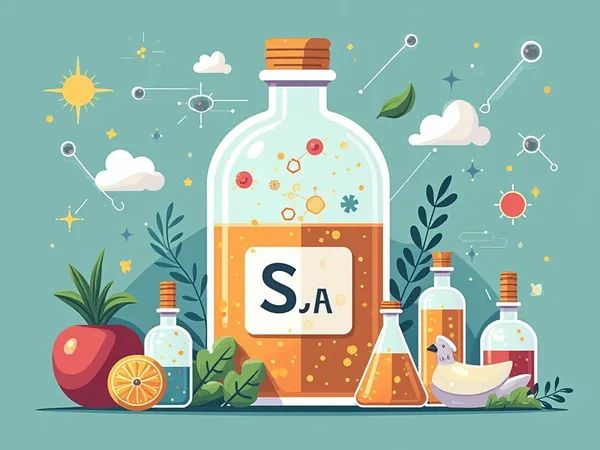
Ready to Start Your Wellness Journey?
Become a Herbalife Preferred Member and enjoy exclusive discounts of up to 25% on all products.
BECOME A PREFERRED MEMBERStrontium Science: Essential Element in Modern Technology
Disclaimer: This article is for informational purposes only and should not be considered medical advice. Always consult a healthcare professional or a registered dietitian before making significant changes to your diet or starting any supplementation.
Introduction
Strontium is a naturally occurring trace element present in soil, water, and various foods. It is chemically similar to calcium and is found in small amounts in the human body, primarily in bone tissue. Research, particularly on pharmaceutical forms such as strontium ranelate, has examined its effects on bone density. This guide reviews current evidence on strontium’s role in bone health, dietary sources, supplementation considerations, clinical findings, typical intake levels, and practical ways to include strontium-rich foods in a balanced diet.
Role in the Body
Specific Functions
Strontium can partly substitute for calcium in the mineral matrix of bone. Clinical studies of strontium ranelate have shown:
• An increase in bone mineral density when used as part of osteoporosis treatment in postmenopausal women• Modulation of osteoblast and osteoclast activity, favoring bone formation in certain pharmacological contexts
Effects of Deficiency
No recognized strontium deficiency syndrome exists. Strontium is not classified as an essential nutrient, and typical diets provide small amounts without specific deficiency-related health issues.
Dietary Sources
Best Food Sources
Strontium content in foods depends on soil and water levels. Foods containing measurable amounts include:
• Root vegetables (carrots, potatoes, beets)• Leafy greens (spinach, kale)
• Whole grains (oats, brown rice, wheat)
• Seafood (shrimp, fish, mussels)
• Dairy products (milk, yogurt, cheese)
• Nuts and seeds (almonds, sunflower seeds, sesame seeds)
Supplementation
Strontium supplements are available in forms such as strontium citrate and, in some countries by prescription, strontium ranelate. Clinical use of strontium ranelate has been investigated for osteoporosis management in postmenopausal women. Anyone considering supplements should consult a healthcare professional to discuss potential benefits, risks, and interactions with calcium and other minerals.
Health Benefits
• Bone Health: Clinical trials of strontium ranelate in postmenopausal osteoporosis have demonstrated increases in bone mineral density and reductions in vertebral fractures over three years of treatment (e.g., studies published in the Journal of Bone and Mineral Research).• Fracture Healing: Animal research indicates strontium may support osteoblast activity at fracture sites; human data are limited and further studies are needed.
Daily Requirements
There are no established dietary reference intakes for strontium. Observational data suggest that typical intakes from food are in the range of 1–4 mg per day. In osteoporosis clinical trials, strontium ranelate was administered as 2 g per day (providing approximately 680 mg elemental strontium) under medical supervision.
Population considerations:
• Children and Adolescents: Obtain strontium from a varied diet; routine supplementation is not recommended.• Pregnant and Breastfeeding Women: Strontium passes the placenta and into breast milk; safety of high-dose supplements has not been established.
• Elderly Adults: May have reduced dietary intake; a balanced diet typically suffices, but those with osteoporosis should follow healthcare advice.
Tips for Incorporation
• Include a variety of vegetables such as root vegetables and leafy greens in meals• Choose whole grains like brown rice, whole-wheat bread, and oats
• Consume seafood a few times per week (e.g., fish, shellfish)
• Incorporate dairy or fortified alternatives if tolerated
• Snack on nuts and seeds for additional mineral intake
• Maintain adequate calcium and vitamin D intake to support bone health
• Consult a dietitian or physician before starting any supplementation
Conclusion and Call to Action
Current evidence does not classify strontium as an essential nutrient, but specific pharmaceutical forms, such as strontium ranelate, have demonstrated bone density benefits in clinical settings. Most people can obtain strontium through a balanced diet that includes vegetables, whole grains, seafood, dairy, nuts, and seeds. Consult a healthcare professional for personalized guidance, especially if you have osteoporosis or other bone health concerns.
Disclaimer: This article is for informational purposes only and should not be considered medical advice. Always consult a healthcare professional or a registered dietitian before making significant changes to your diet or starting any supplementation.
Ready to Start Your Wellness Journey?
Become a Herbalife Preferred Member and enjoy exclusive discounts of up to 25% on all products.
BECOME A PREFERRED MEMBER